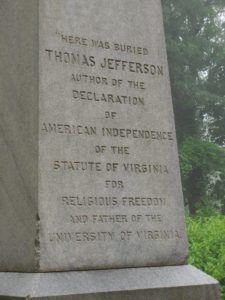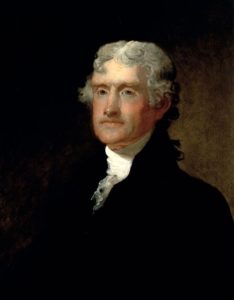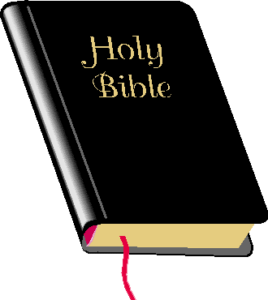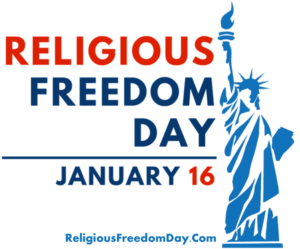 Thomas Jefferson gave instructions that on his grave marker, three achievements would be noted: writer of the Declaration of Independence, “father” of the University of Virginia, and author of the Statute of Virginia for Religious Freedom. In 1992, the United States Congress established January 16 as Religious Freedom Day since “Bill No. 82” was passed by the Virginia State Legislature on the 16th of January, 1786. Though written by Jefferson in 1777, its ideas were championed by James Madison in Congress in order to pass the First Amendment to the Bill of Rights in 1791. Jefferson’s Statute and the First Amendment established religious liberty in America.
Thomas Jefferson gave instructions that on his grave marker, three achievements would be noted: writer of the Declaration of Independence, “father” of the University of Virginia, and author of the Statute of Virginia for Religious Freedom. In 1992, the United States Congress established January 16 as Religious Freedom Day since “Bill No. 82” was passed by the Virginia State Legislature on the 16th of January, 1786. Though written by Jefferson in 1777, its ideas were championed by James Madison in Congress in order to pass the First Amendment to the Bill of Rights in 1791. Jefferson’s Statute and the First Amendment established religious liberty in America.
The first paragraph of the Virginia Statute for Religious Freedom states: “Well aware that Almighty God hath created the mind free; that all attempts to influence it by temporal punishments or burthens, or by civil incapacitations, tend only to beget habits of hypocrisy or meanness, and are a departure from the plan of the Holy Author of our religion, who, being Lord both of body and mind, yet chose not to propagate it by coercions on either…”
Eleven of the original 13 colonies required one to be a Christian in order to hold office. At the state level, Christianity was the foundation of law. However, the state establishment (often with financial support) of a specific Christian denomination was problematic as well, for it used the force of law to favor one form of Christianity over another. Religious toleration, not freedom, was the result. As historian Philip Schaff has noted:
“The American system differs from the system of toleration… Toleration exists where the government supports one or more churches, and permits other religious communities… under certain conditions… There is a very great difference between toleration and liberty. Toleration is a concession, which may be withdrawn; it implies a preference for the ruling form of faith and worship… It may be coupled with restrictions and disabilities… In our country we ask no toleration for religion and its free exercise, but we claim it as an unalienable right.” (emphasis added)
 Since all humans are sinful, those with power could exercise control over the others. The second section of the Virginia Statute addressed this problem: “No man shall be compelled to frequent or support any religious worship, place or ministry… or otherwise suffer on account of his religious opinion or belief.” Some say that when the Framers wrote Article VI, forbidding a religious test in order to hold office, that they were intending a “secular” state. But the evidence suggests otherwise, for as Joseph Story wrote, “The same policy, which introduced into the Constitution the prohibition of any religious test, led to the more extended prohibition of the interference of Congress in religious concerns.” This idea was, in essence, a protection of religious liberty at the state level that led to the same protection at the federal level when the Constitution was ratified.
Since all humans are sinful, those with power could exercise control over the others. The second section of the Virginia Statute addressed this problem: “No man shall be compelled to frequent or support any religious worship, place or ministry… or otherwise suffer on account of his religious opinion or belief.” Some say that when the Framers wrote Article VI, forbidding a religious test in order to hold office, that they were intending a “secular” state. But the evidence suggests otherwise, for as Joseph Story wrote, “The same policy, which introduced into the Constitution the prohibition of any religious test, led to the more extended prohibition of the interference of Congress in religious concerns.” This idea was, in essence, a protection of religious liberty at the state level that led to the same protection at the federal level when the Constitution was ratified.
But how do we keep Christianity as the basis of law in a nation at both the state and national level without enforcing it by law? Alexis deTocqueville observed in 1830 that “religion in America takes no direct part in the government of society, but it must be regarded as the first of their political institutions.” How could it be the first “political” institution if it was not enforced as such? He continues, “In the United States the sovereign authority is religious… there is no country in the world where the Christian religion retains a greater influence over the souls of men than in America.” In other words, Christianity held influence as a voluntary religion. And as Jefferson observed, it cannot be sustained by force of law or it violates its very nature!
 Jesus taught in Matthew 13:32 that the Kingdom of God is like a mustard seed; “but when it is grown, it is the greatest among herbs, and becometh a tree, so that the birds of the air come and lodge in the branches thereof.” The Kingdom’s influence would shelter all kinds of “birds of the air.” Birds are symbols of ideas, both godly and ungodly. Christianity, by its very nature, when influencing a culture, protects even those who do not espouse its beliefs. No other religion does so. It is thus through prayer (1st Timothy 2:1-7) and voluntary generational influence of the heart, that Christianity blesses the earth.
Jesus taught in Matthew 13:32 that the Kingdom of God is like a mustard seed; “but when it is grown, it is the greatest among herbs, and becometh a tree, so that the birds of the air come and lodge in the branches thereof.” The Kingdom’s influence would shelter all kinds of “birds of the air.” Birds are symbols of ideas, both godly and ungodly. Christianity, by its very nature, when influencing a culture, protects even those who do not espouse its beliefs. No other religion does so. It is thus through prayer (1st Timothy 2:1-7) and voluntary generational influence of the heart, that Christianity blesses the earth.
As Herb Titus observed, “If God, Himself, who has all power and authority, has chosen not to use force to impose the true religion upon mankind, Jefferson observed, how dare men assume dominion over the faith of others, setting up their own opinions and modes of thinking as the only true and infallible.” As the Pilgrims had noted when leaving England, such power in civil government assumes a dominion over the conscience that is unwarranted.
The final paragraph in the original Statute stated: “And though we well know that this Assembly, elected by the people for the ordinary purposes of legislation only, have no power to restrain the acts of succeeding Assemblies, constituted with powers equal to our own, and that therefore to declare this act [to be] irrevocable would be of no effect in law; yet we are free to declare, and do declare, that the rights hereby asserted are of the natural rights of mankind, and that if any act shall be hereafter passed to repeal the present or to narrow its operation, such act will be an infringement of natural right.” Here Jefferson and the Assembly declare that their religious liberty is a “natural right,” or one given by God to them directly which is unalienable.
 Some today suppose that the Constitution is secular because it does not enforce Christianity by law from the top. Others say it is not Christian because it allows those who do not believe in God or profess Christ to run for office. But, as historian Verna Hall once wrote, “The determining fact, we submit, is not whether Christians formed the Constitution, but whether the form is Christian according to the Word of God.” It is in fact true that every religion, if influential in their nation, will produce a corresponding form of government that reflects its tenets. A civil government resting on self-government and leaving it up to the individual and family to voluntarily pass down their faith to future generations is the methodology of only one religion, Christianity. Others must rely on the force of law.
Some today suppose that the Constitution is secular because it does not enforce Christianity by law from the top. Others say it is not Christian because it allows those who do not believe in God or profess Christ to run for office. But, as historian Verna Hall once wrote, “The determining fact, we submit, is not whether Christians formed the Constitution, but whether the form is Christian according to the Word of God.” It is in fact true that every religion, if influential in their nation, will produce a corresponding form of government that reflects its tenets. A civil government resting on self-government and leaving it up to the individual and family to voluntarily pass down their faith to future generations is the methodology of only one religion, Christianity. Others must rely on the force of law.
Today we need to heed the warning of Robert C. Winthrop, descendant of Puritan John Winthrop, and Speaker of the House of Representatives from 1847-1849:
“All societies of men must be governed in some way or other. The less they have of stringent State Government, the more they must have of individual self-government. The less they rely on public law or physical force, the more they must rely on private, moral restraint. Men, in a word, must necessarily be controlled, either by a power within them, or by a power without them; either by the Word of God, or by the strong arm of man; either by the Bible, or by the bayonet.”







